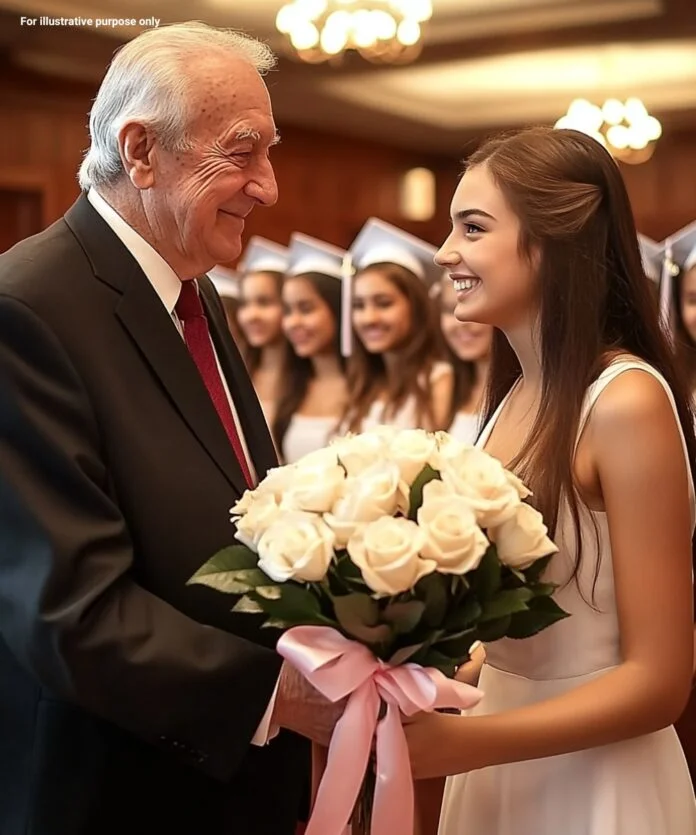For most of her life, Tatyana was invisible—not because she lacked talent, beauty, or intelligence, but because of the secret she carried. A secret whispered behind her back by classmates, a label that followed her through every school hallway: “the homeless girl.”
From her first days at school, Tatyana stood out—but not in the way any child hopes. While other kids arrived in shiny cars with smiling parents, she came alone, sometimes walking, sometimes taking long rides on crowded buses. Her clothes were clean but worn, her eyes tired yet determined. While other children dreamed of vacations, new clothes, and parties, she quietly returned to a small apartment she shared with her elderly grandmother—the only family she had.
A Story Built on Lies
Tatyana had always believed her father died before she was born. Her grandmother painted him as a kind man who died in an accident—a simple story she accepted without question as a child. But the truth was far more painful.
As she grew older, rumors surfaced about a ragged man wandering near the school—dirty, talking to himself. His name was Pavel. Some kids claimed he was Tatyana’s father. She dismissed it as cruel gossip.
One evening, after a rough day, Tatyana finally confronted her grandmother. After a long silence, her grandmother sighed and said, “Tatyana, your father isn’t dead. He’s alive… but he’s been unwell for a long time.”
Pavel had struggled with addiction and mental illness. After Tatyana’s mother died when she was a toddler, he vanished into the streets. Her grandmother raised Tatyana with all the love she could, but the shame of her son’s fate was too heavy to share—even with her granddaughter.
Outcast Among Peers
Once the truth slipped out, life got harder. Kids who once ignored her now pointed, laughed, and sneered. “The homeless man’s daughter,” they called her. Some mocked her in class, asking if her dad slept in a cardboard box.
She never cried at school—not wanting to give them satisfaction. But at home, behind the closed door of her small bedroom, she often broke down. Her grandmother held her tight and whispered, “You aren’t where you come from. You’re where you’re going.”
Those words stayed with her.
She pushed herself harder. She studied while others partied, volunteered at the school library to avoid bullies, and worked part-time to help with groceries. No matter how tough life got, she kept her head up—not out of pride, but survival.
Graduation Day: A Turning Point
Graduation was bittersweet. Tatyana was proud of her achievements—top grades, glowing teacher recommendations, college dreams—but she still felt like an outsider.
While classmates posed with parents, laughing, Tatyana sat quietly at the back, wearing a secondhand gown, her grandmother proudly by her side.
Then something unexpected happened.
Whispers spread as security and officials entered. Moments later, the governor himself appeared.
Confused, people wondered why he had come without notice.
The principal addressed the crowd: “Today, Governor Mikhailov honors a student whose strength and resilience embody overcoming adversity.”
She paused and then said, “Tatyana Veklenko, please come forward.”
Silence fell.
Tatyana froze—why her? But with a gentle nudge from her grandmother, she stood and walked forward. Every eye was on her—the classmates who had mocked, the teachers who admired quietly, the parents who had never heard her name.
The governor smiled and said, “Tatyana, your courage and dignity surpass many adults I know. You are the future. I am pleased to award you a full scholarship to the National University.”
Gasps and applause erupted. Those who once teased her looked away, ashamed. Some cried. Others stood, clapping in stunned respect.
Tatyana barely heard it. Her heart raced. All she thought of was her grandmother, quietly weeping, and how far they had come.
A Lesson in Humility and Hope
That day changed Tatyana’s life.
She went on to study psychology, aiming to help people like her father and herself. She remained humble, never forgetting her roots. She shared her story—not for pity, but to show that where you start doesn’t define where you end.
Though she never reunited with her father, she chose forgiveness. “I don’t hate him,” she once said. “He was lost. But I refuse to let his story end mine.”
